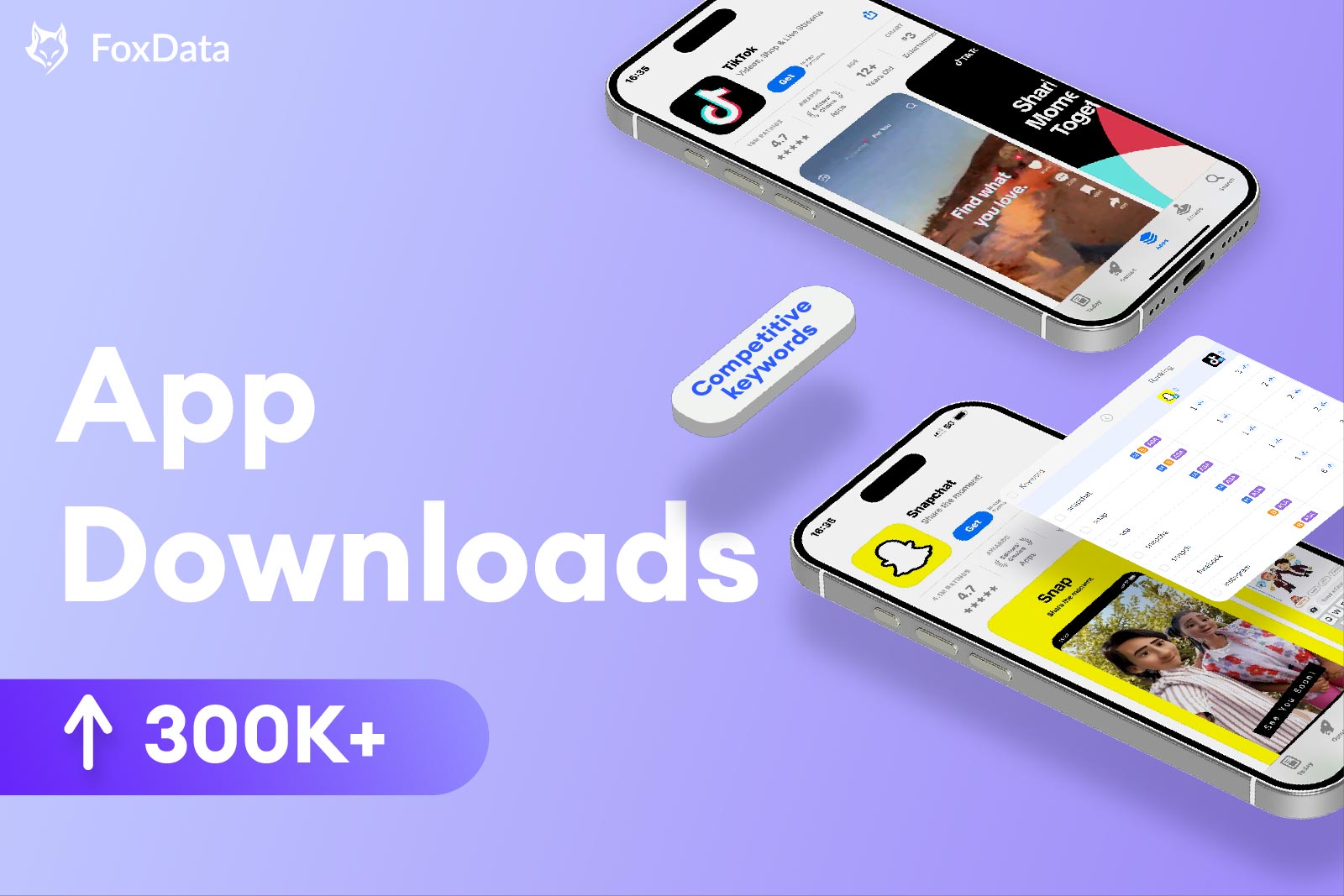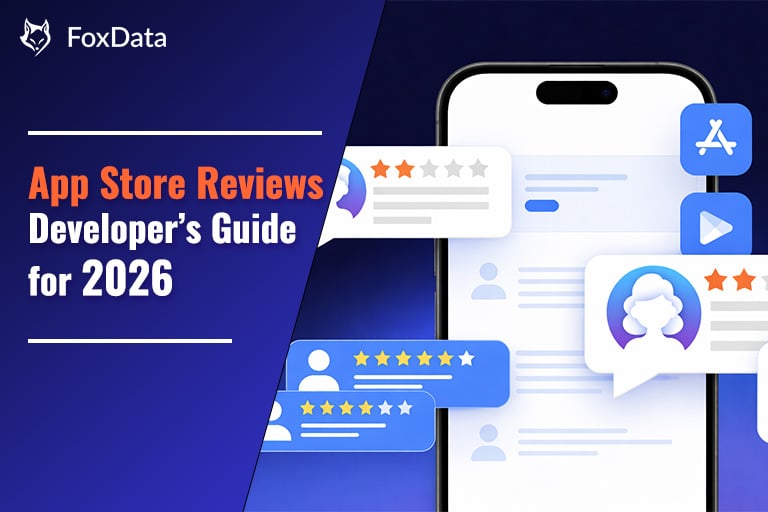The Real App Store Ranking Factors in 2025 — And How Developers Can Actually Win With FoxData
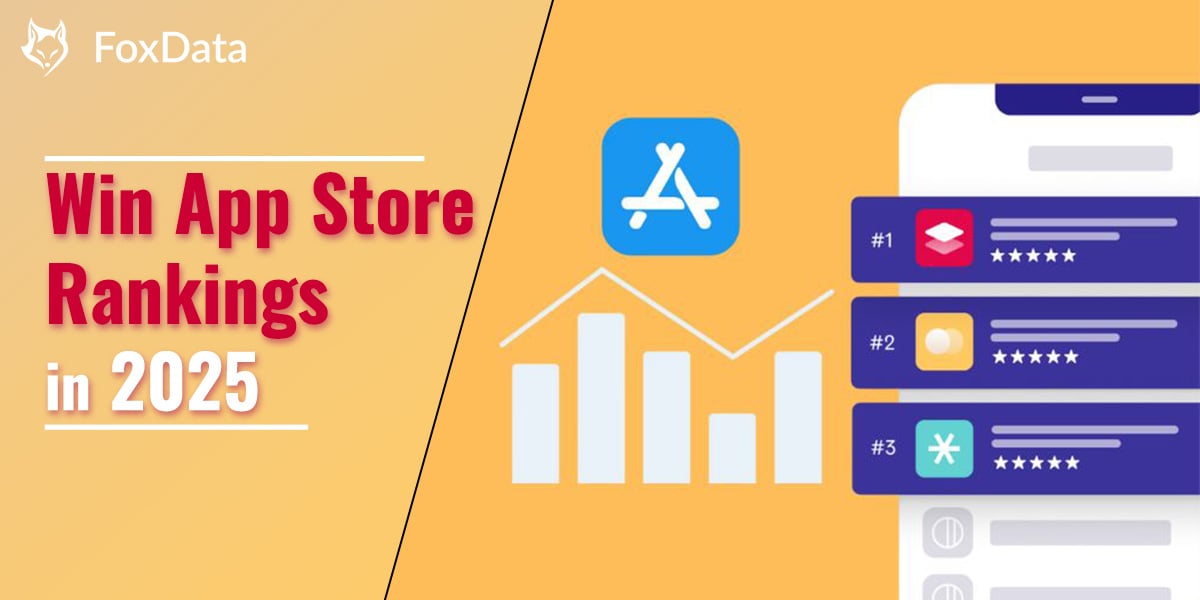
Why Ranking in the App Store Still Feels Difficult in 2025
Visibility in the App Store has never been evenly distributed.
Most developers know they should do ASO — the real challenge is consistency, reliable data, fast iteration, and choosing battles where ranking is actually achievable.
Apple’s search algorithm is evolving quietly toward three main signals:
- Keyword–App Relevance: Does your app match the search intent?
- Quality Signals Based on User Behavior: Downloads, retention, ratings, engagement, and conversion matter more than ever.
- Metadata Precision & Semantic Alignment: Apple increasingly prioritizes accurate, intention-driven metadata.
In 2025, ranking is no longer about “optimizing pages once.” Success depends on running a repeatable, data-driven workflow — and this is where FoxData provides developers with real operational clarity, especially during high-traffic periods like Black Friday.
1. App Store Ranking Factors in 2025
Apple doesn't reveal its algorithm, but aggregated 2024–2025 trends confirm the ranking system operates in two layers:
Layer 1 — Eligibility: Can Apple match your app to the keyword?
(Driven by metadata, captions, tags, and event relevance.)
Layer 2 — Quality & Engagement: Does Apple trust your app enough to promote it?
(Driven by downloads, retention, ratings, conversion, and semantic behavior.)
Understanding both layers is crucial before planning ASO strategies.
Metadata — The Foundation of Eligibility
App Name, Subtitle, and Keyword Field remain the most influential explicit ranking inputs.
App Name (Highest Weight):
- Combine brand + core value
- Avoid keyword stuffing — readability drives tap-through rate
Optimizing Metadata in Practice:
Instead of guessing, developers should follow a full-cycle, data-backed workflow.
2. 2025 Updates Developers Should Know
Several new changes are shaping how Apple surfaces apps in search:
✓ Screenshot Captions Now Indexed (Beta)
Captions in screenshots contribute to keyword eligibility in iOS 26 beta.
- Implication: Developers must prioritize visual ASO, including screenshot quality, icon design, and preview videos.
💡 Practical Tip:
Use FoxData's ASO Report to benchmark against top-performing competitors.
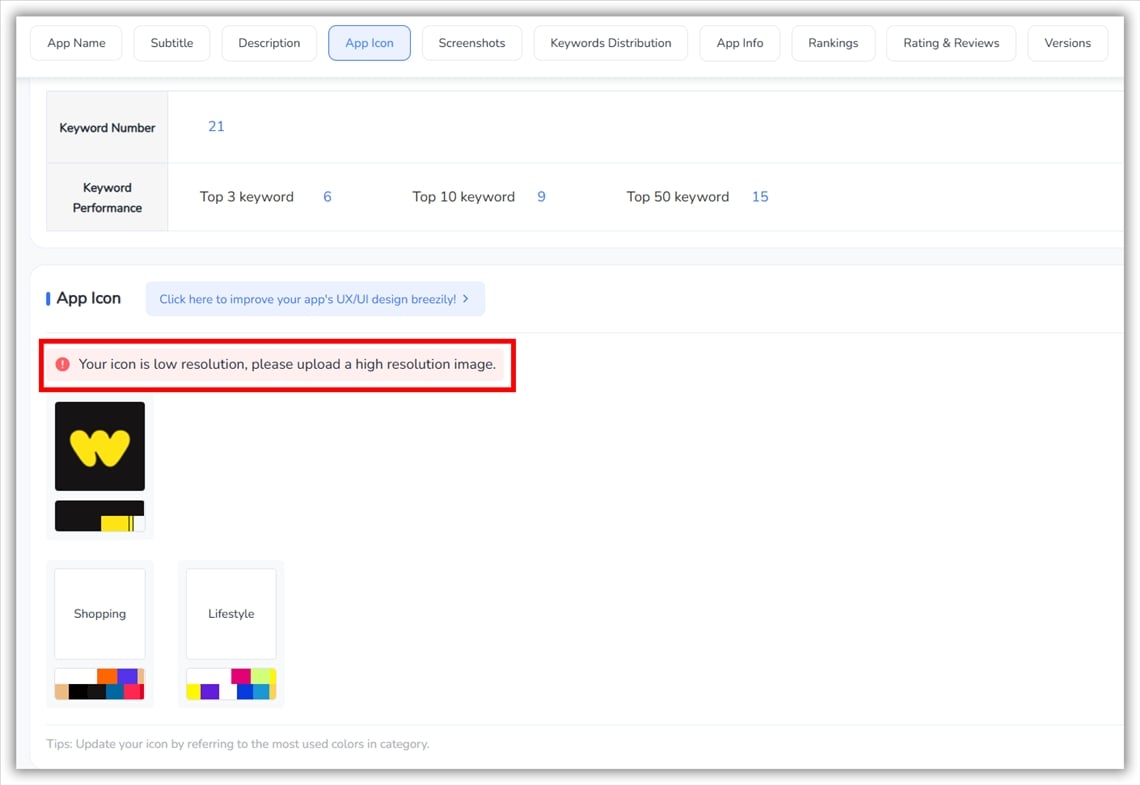
✓ In-App Events Influence Search Matching
Events help apps appear for seasonal or interest-based queries.
Use ASO Impact Analysis to identify which events competitors launch and which keywords they capture.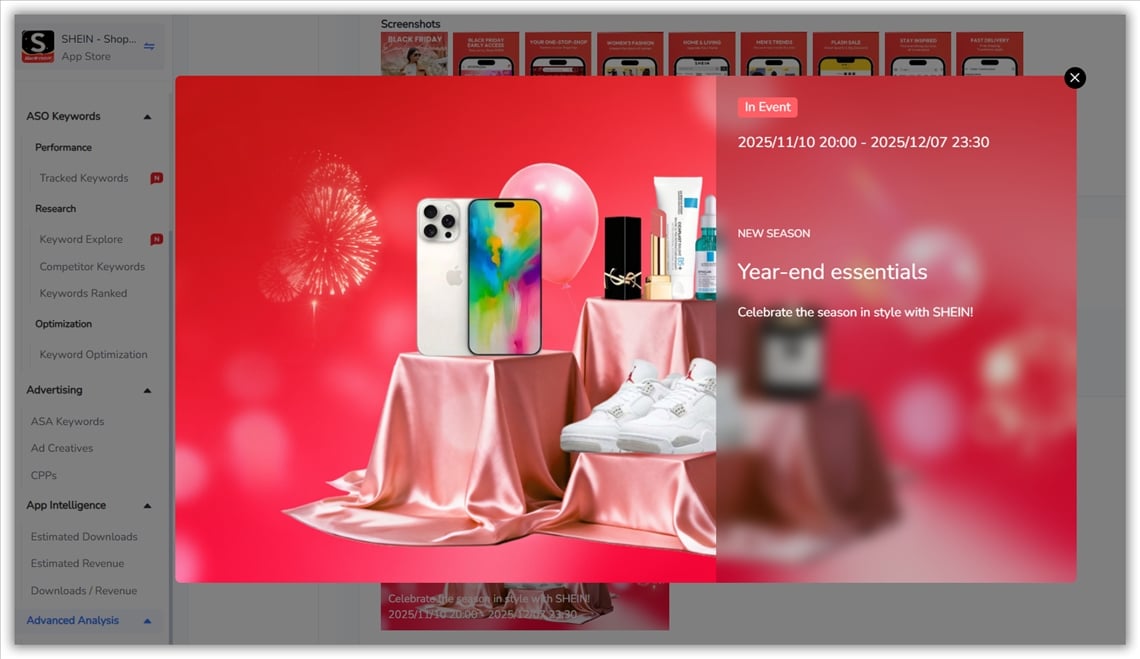
✓ Custom Product Pages (CPPs)
Apple is increasing CPP limits: searching for a keyword can now display a CPP instead of your default page.
What this means:
Developers must build keyword-specific pages (e.g., “budget app”, “habit tracker”, “meditation for sleep”).
Otherwise, competitors will out-convert you regionally.
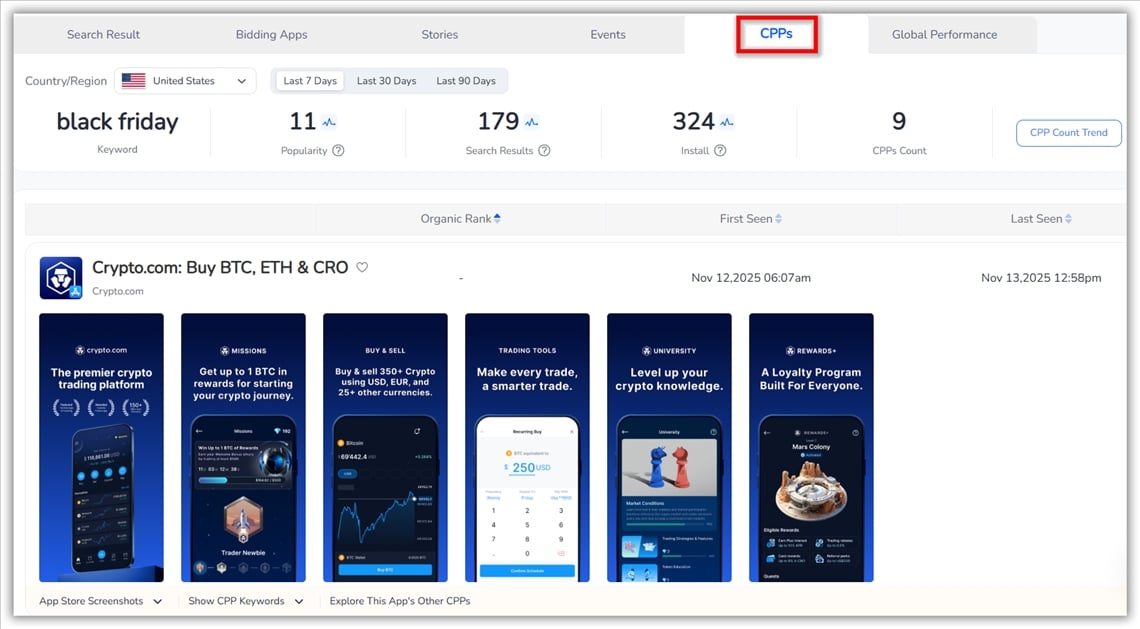
✓ AI-Generated Tags in iOS 26 (Beta)
Apple now auto-generates semantic tags based on app usage patterns. Simple keyword stuffing is insufficient; ASO now requires intent-driven, semantic keyword strategies.
This means:
- Basic metadata patterns won’t be enough
- Apple is prioritizing intent-based search
- Metadata must reflect actual product value
A Practical FoxData Workflow:
1. Collect Existing Ranking Keywords:Use Tracked Keywords to see which keywords your app currently ranks for, including daily changes and trends.
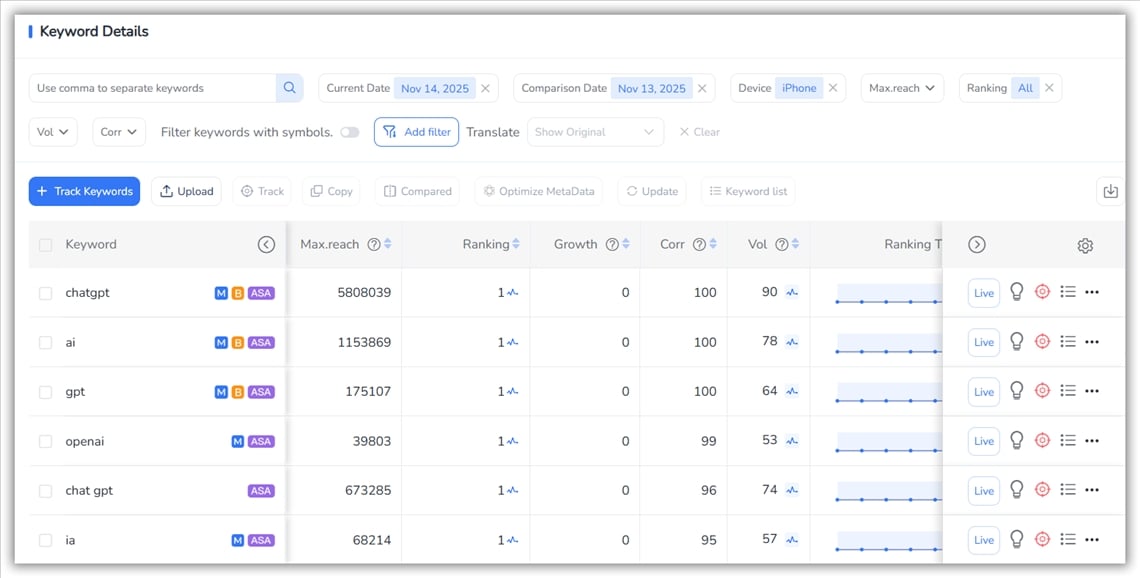
2. Keyword Discovery & Expansion:
- Use Keyword Explore, Competitor Keywords and Keywords Ranked to uncover untapped opportunities.
- Expand keywords systematically using the following dimensions:
- Metadata: Keywords already in your app
- Search Volume: High-traffic keywords
- Ranking Distribution: Current ranking positions
- Opportunity Score: High-potential opportunities
- Keyword Changes: Recent ranking trends
- Store Suggested / Category: App Store suggestions
- Long-Tail Keywords / Search Corrections: Low-competition long-tail phrases and search corrections
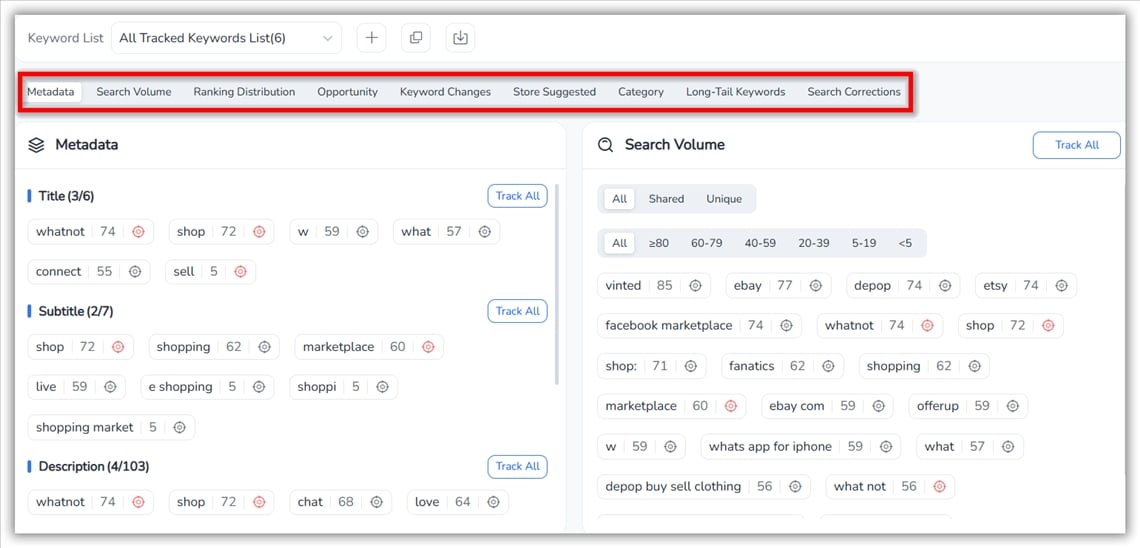
3. Map Keywords to Metadata Fields:
Assign high-potential keywords to App Name, Subtitle, and Keyword Field based on opportunity score and competitive gaps.
4. Monitor & Iterate:
Track ranking movements daily, compare against competitors, and refine keyword placements.
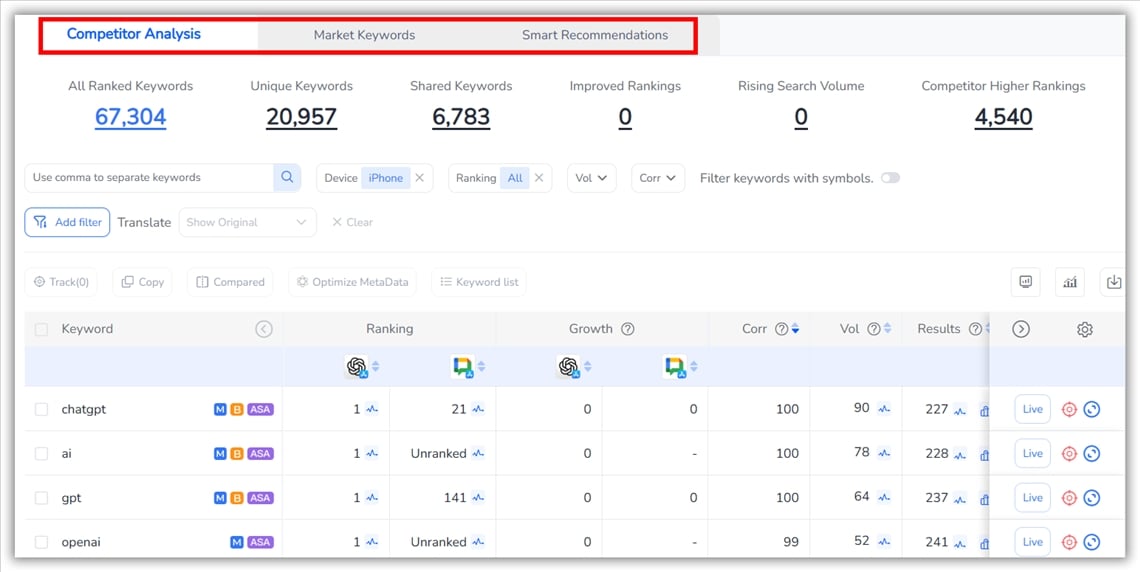
This workflow ensures metadata decisions are strategic, data-backed, and repeatable.
3. The Indirect Ranking Factors That Decide Whether You Actually Climb
Once you meet Apple’s relevance requirements, your actual placement depends on quality signals. These indirect factors determine whether you move from “eligible to rank” to “actually ranking high.”
Download Velocity
Strong download momentum accelerates rankings — especially during updates, UA bursts, and seasonal peaks.
How FoxData Helps:
FoxData’s App Intelligence gives you:
- Estimated daily downloads across any time range
- Country-level download trends
- Direct competitor comparisons
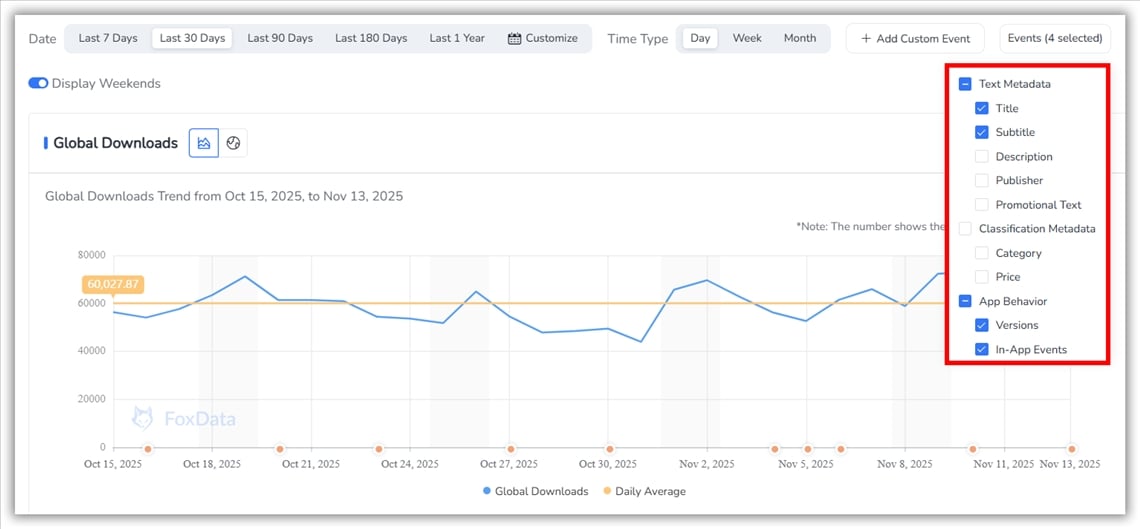
This helps teams validate whether a campaign or ASO update is genuinely driving momentum.
Ratings & Reviews
Apple favors apps above 4.2 stars, pushing them harder in search.
How FoxData Helps:
Turn reviews into actionable insights:
- Rating trends
- Competitor sentiment comparison
- AI-generated summaries of what users love or dislike
Developers get a clear roadmap for improving conversions and retention.
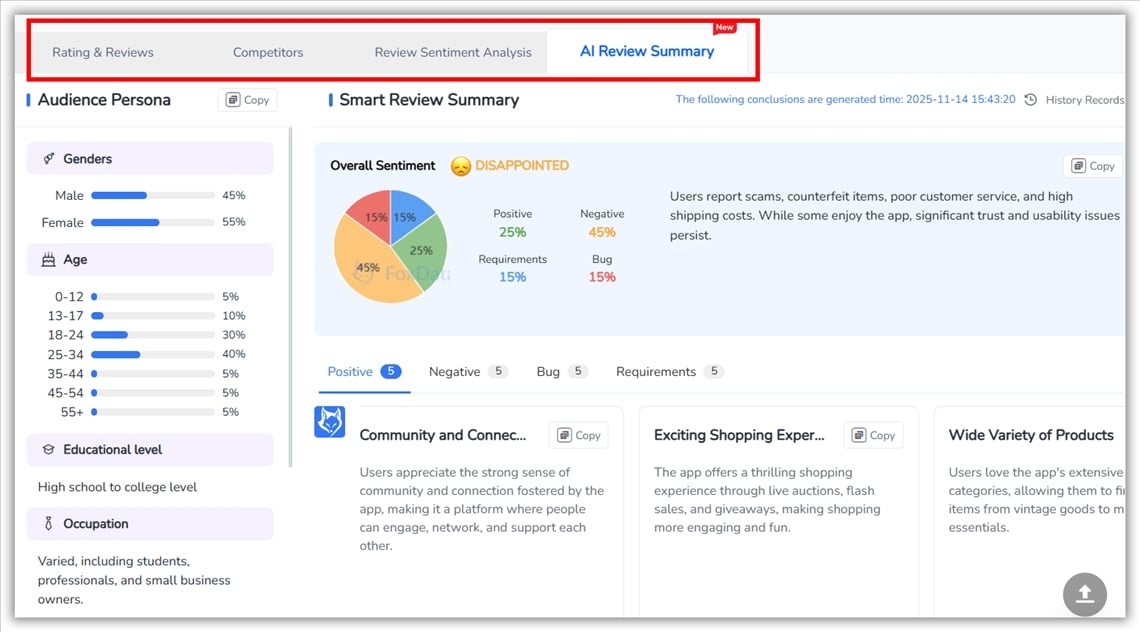
👉 Learn more in our Review & Ratings feature guide
Engagement & Retention
Apple ranks apps with better session length and retention higher because they are “safer recommendations.” With UA costs rising to $3–$10 per install, retention directly impacts profitability.
How FoxData Helps:
FoxData’s User Retention Analysis Tool:
- Tracks your app and any competitor
- Compares 1/3/7/14/30-day retention
- Highlights retention dips tied to events
Correlated events include In-App Events, CPP updates, Meta Ads, Keyword Rank Drops, and App Ranking Drops. Combined with review sentiment analysis and AI summaries, developers can quickly identify why retention changes and what to fix.
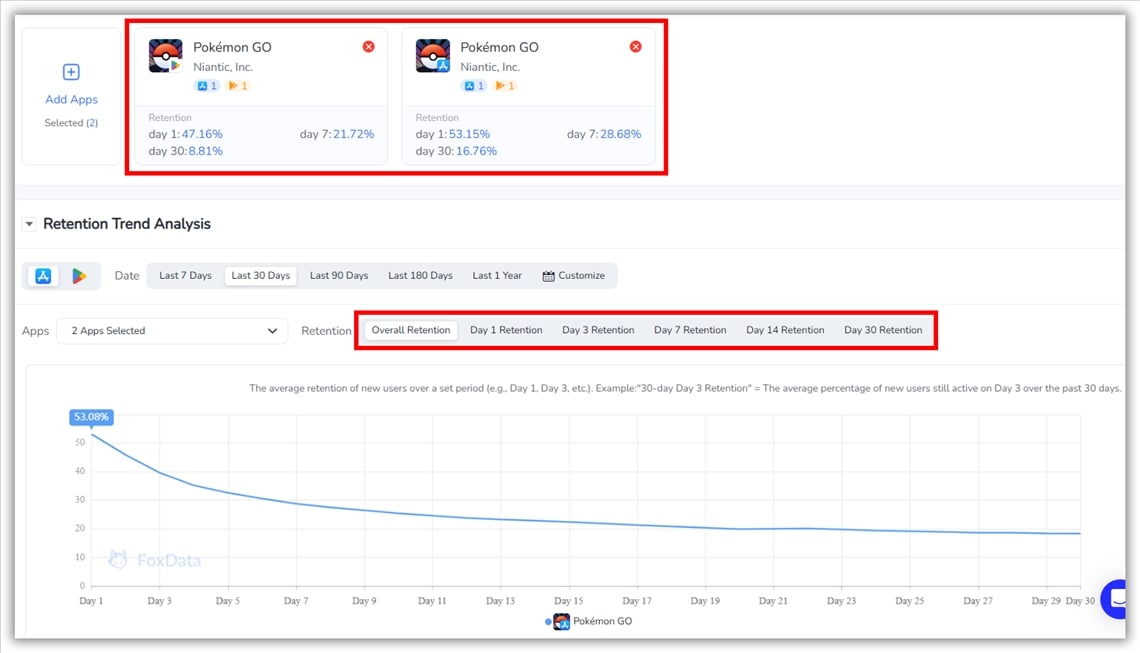
Conversion Rates
Keyword-level conversion is influenced by:
- Icon
- Top 3 screenshots
- Preview video
- Localized messaging
And in 2025, Apple’s scoring system weighs these elements more heavily than before.
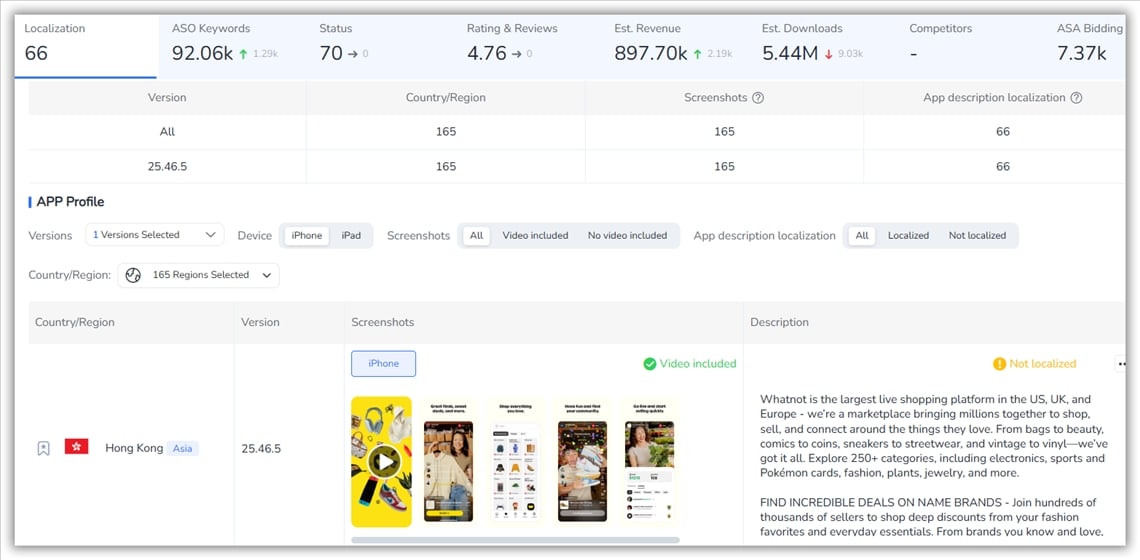
FoxData removes the guesswork with conversion insights and benchmark comparisons across competitors.
Dive into the latest global app delisting data to uncover key trends, platform insights, and what app removals reveal about the app market in November 2025.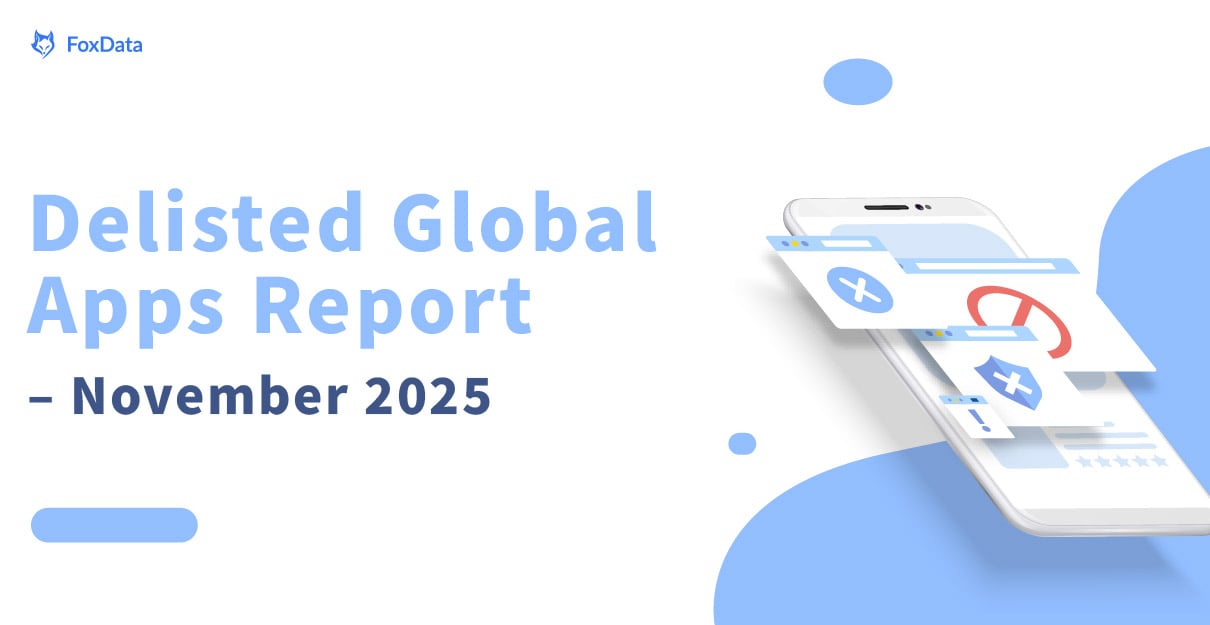
4. How Developers Should Actually Optimize in 2025
Below is a practical workflow used by real ASO teams — not generic theory.
Step 1 — Build a Keyword Strategy You Can Win
Use FoxData's Keyword Analytics:
- Identify long-tail keywords competitors ignore
- Compare Opportunity Score, Search Volume, Ranking Distribution
- Group keywords into Tier 1 / Tier 2 priority sets
- Map each set to App Name, Subtitle, and Keyword Field
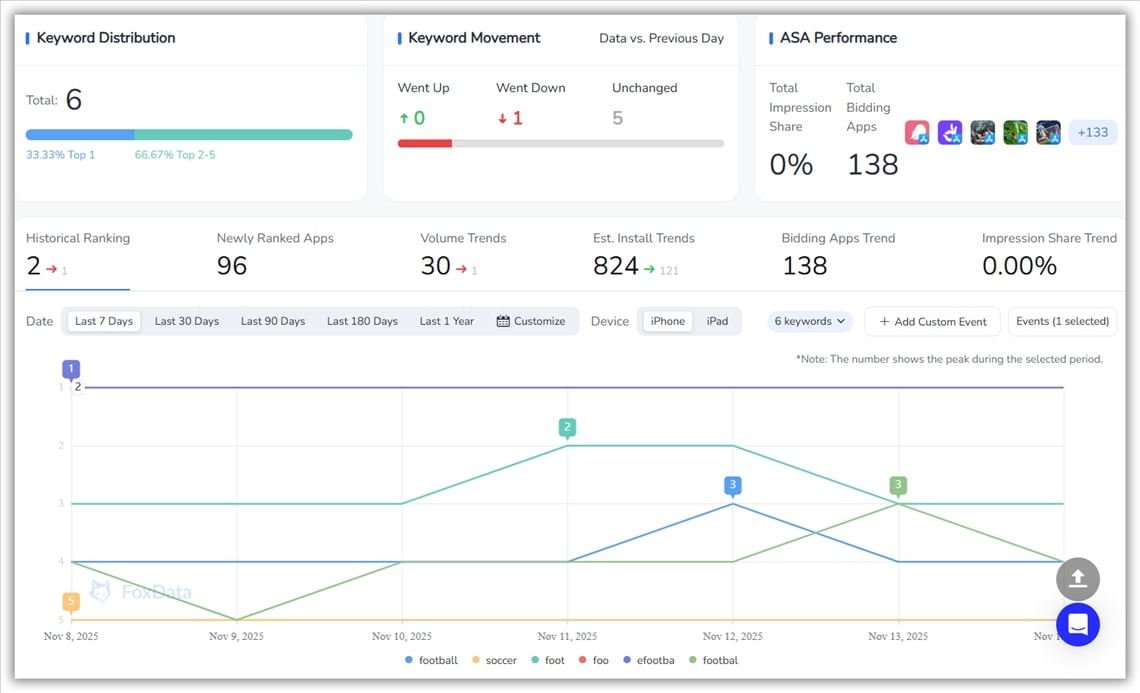
Goal: Make Apple certain what niche you fit into.
Step 2 — Structure Metadata Updates Around Real Data
Inside ASO Workflow:
- Push metadata variations
- Track live ranking performance
- Measure keyword shifts after every update
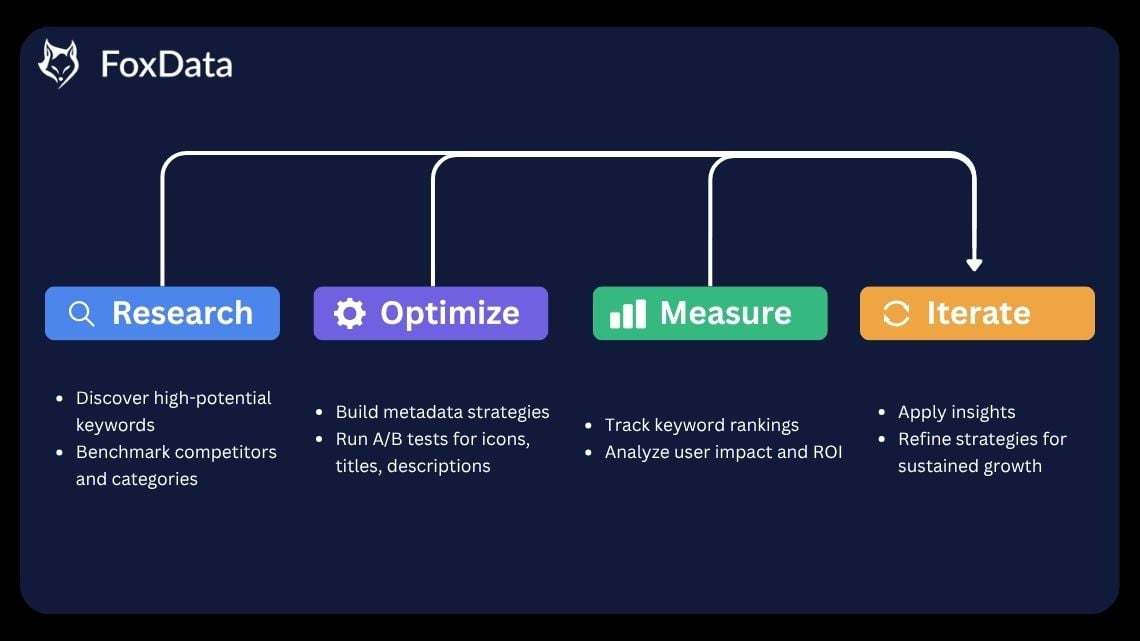
No spreadsheets. No guessing.
Just a structured, repeatable pipeline.
Step 3 — Optimize Screenshots for Both Conversion & Indexing
Because captions now index:
- Use keyword-aligned captions
- Highlight functional value
- Mirror top-performing competitor patterns
FoxData identifies what high-ranking apps show first — and why.
Step 4 — Leverage CPPs as Keyword Landing Pages
Use FoxData's CPPs insights to:
- map specific keywords to CPP variations
- test value propositions per region
- track organic search performance per CPP
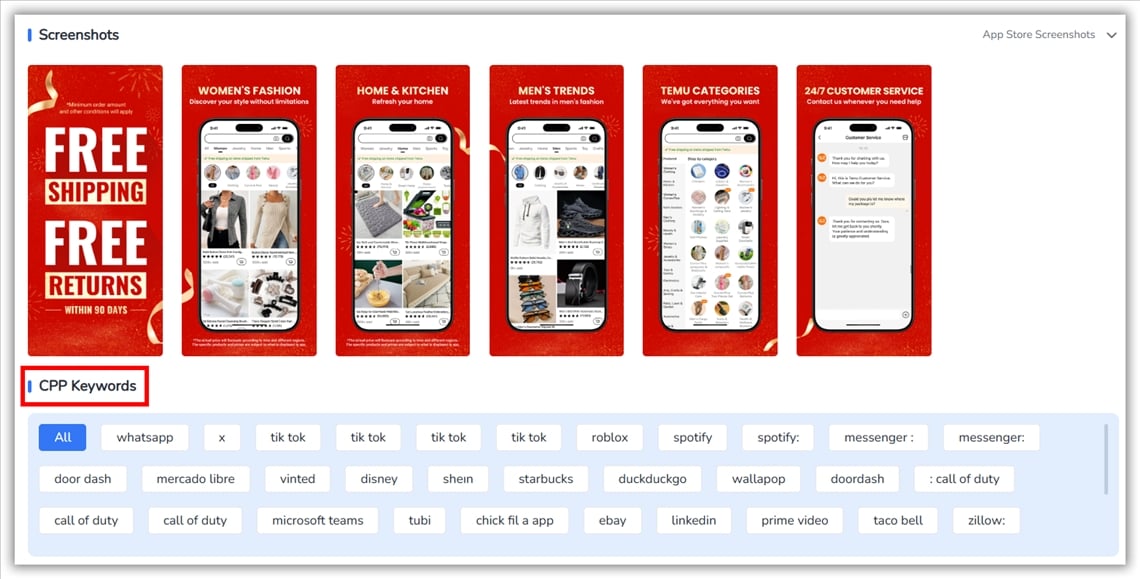
This instantly increases conversion without touching the main page.
Step 5 — Build Seasonal Momentum Through Events
For Black Friday, Christmas, Year-End:
- schedule discounts
- launch limited-time features
- add seasonal messaging
Inside FoxData, track competitor event activity and time yours competitively.
Step 6 — Monitor Ranking, Retention, and Ratings Holistically
FoxData centralize:
✅ Keyword shifts
✅ Market insights
✅ Category ranking
✅ Global overview
✅ Advertising signals
✅ Rating & review sentiment
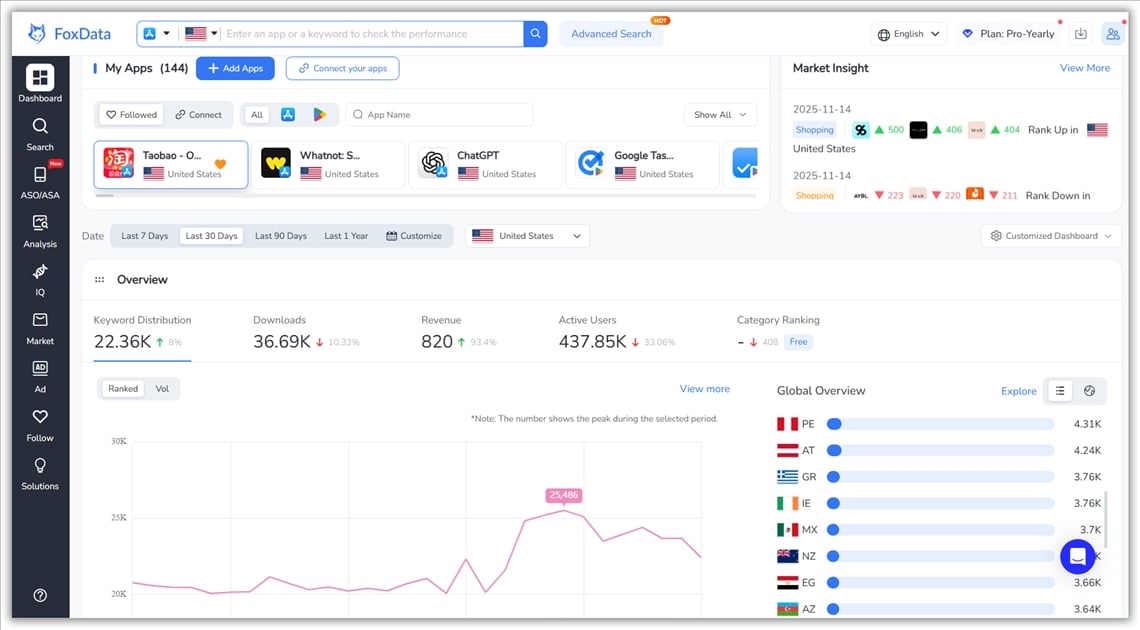
This becomes your weekly “decision board.”
Why Black Friday 2025 Is Your Best Chance to Rank Faster
Black Friday drives the strongest download velocity of the year:
➡️ More searches
➡️ Higher store traffic
➡️ Faster algorithm reactions
➡️ Lower UA costs
➡️ Stronger retention + conversion data
Optimize now, and Apple will pick up your positive signals faster — giving you a ranking lift right before holiday volume peaks.

And FoxData’s Black Friday event is launching soon — early registrants will get access to the deepest ASO workflow tools at the best rates of the year.
Final Checklist
☐ Update your metadata using real keyword data
☐ Optimize screenshot captions for indexing
☐ Build at least 2 seasonal CPPs
☐ Prepare an in-app event for Black Friday
☐ Improve ratings through prompts and replies
☐ Drive a short burst of paid traffic to lift velocity
Execute these steps with FoxData, and your odds of ranking growth in November–December rise dramatically.
Conclusion
In a competitive app marketplace, the teams that win are the ones who operate with real signals — not guesswork.
FoxData gives developers the clarity, speed, and structure needed to execute high-impact ASO and ASA workflows, improve rankings faster, and turn insights into sustained growth.
👉 Start your FoxData free trial now and get ahead before Black Friday traffic surges.


